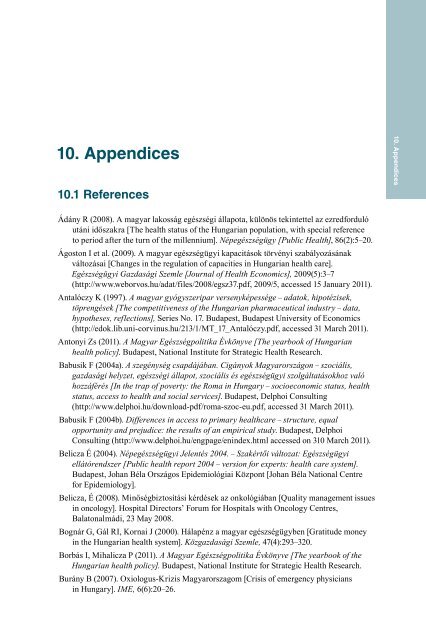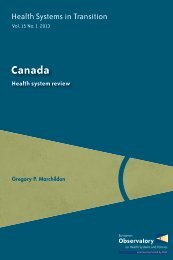Health Systems in Transition - Hungary - World Health Organization ...
Health Systems in Transition - Hungary - World Health Organization ...
Health Systems in Transition - Hungary - World Health Organization ...
Create successful ePaper yourself
Turn your PDF publications into a flip-book with our unique Google optimized e-Paper software.
10. Appendices<br />
10.1 References<br />
Ádány R (2008). A magyar lakosság egészségi állapota, különös tek<strong>in</strong>tettel az ezredforduló<br />
utáni időszakra [The health status of the Hungarian population, with special reference<br />
to period after the turn of the millennium]. Népegészségügy [Public <strong>Health</strong>], 86(2):5–20.<br />
Ágoston I et al. (2009). A magyar egészségügyi kapacitások törvényi szabályozásának<br />
változásai [Changes <strong>in</strong> the regulation of capacities <strong>in</strong> Hungarian health care].<br />
Egészségügyi Gazdasági Szemle [Journal of <strong>Health</strong> Economics], 2009(5):3–7<br />
(http://www.weborvos.hu/adat/files/2008/egsz37.pdf, 2009/5, accessed 15 January 2011).<br />
Antalóczy K (1997). A magyar gyógyszeripar versenyképessége – adatok, hipotézisek,<br />
töprengések [The competitiveness of the Hungarian pharmaceutical <strong>in</strong>dustry – data,<br />
hypotheses, reflections], Series No. 17. Budapest, Budapest University of Economics<br />
(http://edok.lib.uni-corv<strong>in</strong>us.hu/213/1/MT_17_Antalóczy.pdf, accessed 31 March 2011).<br />
Antonyi Zs (2011). A Magyar Egészségpolitika Évkönyve [The yearbook of Hungarian<br />
health policy]. Budapest, National Institute for Strategic <strong>Health</strong> Research.<br />
Babusik F (2004a). A szegénység csapdájában. Cigányok Magyarországon – szociális,<br />
gazdasági helyzet, egészségi állapot, szociális és egészségügyi szolgáltatásokhoz való<br />
hozzáférés [In the trap of poverty: the Roma <strong>in</strong> <strong>Hungary</strong> – socioeconomic status, health<br />
status, access to health and social services]. Budapest, Delphoi Consult<strong>in</strong>g<br />
(http://www.delphoi.hu/download-pdf/roma-szoc-eu.pdf, accessed 31 March 2011).<br />
Babusik F (2004b). Differences <strong>in</strong> access to primary healthcare – structure, equal<br />
opportunity and prejudice: the results of an empirical study. Budapest, Delphoi<br />
Consult<strong>in</strong>g (http://www.delphoi.hu/engpage/en<strong>in</strong>dex.html accessed on 310 March 2011).<br />
Belicza É (2004). Népegészségügyi Jelentés 2004. – Szakértői változat: Egészségügyi<br />
ellátórendszer [Public health report 2004 – version for experts: health care system].<br />
Budapest, Johan Béla Országos Epidemiológiai Központ [Johan Béla National Centre<br />
for Epidemiology].<br />
Belicza, É (2008). M<strong>in</strong>őségbiztosítási kérdések az onkológiában [Quality management issues<br />
<strong>in</strong> oncology]. Hospital Directors’ Forum for Hospitals with Oncology Centres,<br />
Balatonalmádi, 23 May 2008.<br />
Bognár G, Gál RI, Kornai J (2000). Hálapénz a magyar egészségügyben [Gratitude money<br />
<strong>in</strong> the Hungarian health system]. Közgazdasági Szemle, 47(4):293–320.<br />
Borbás I, Mihalicza P (2011). A Magyar Egészségpolitika Évkönyve [The yearbook of the<br />
Hungarian health policy]. Budapest, National Institute for Strategic <strong>Health</strong> Research.<br />
Burány B (2007). Oxiologus-Krizis Magyarorszagom [Crisis of emergency physicians<br />
<strong>in</strong> <strong>Hungary</strong>]. IME, 6(6):20–26.<br />
10. Appendices
















